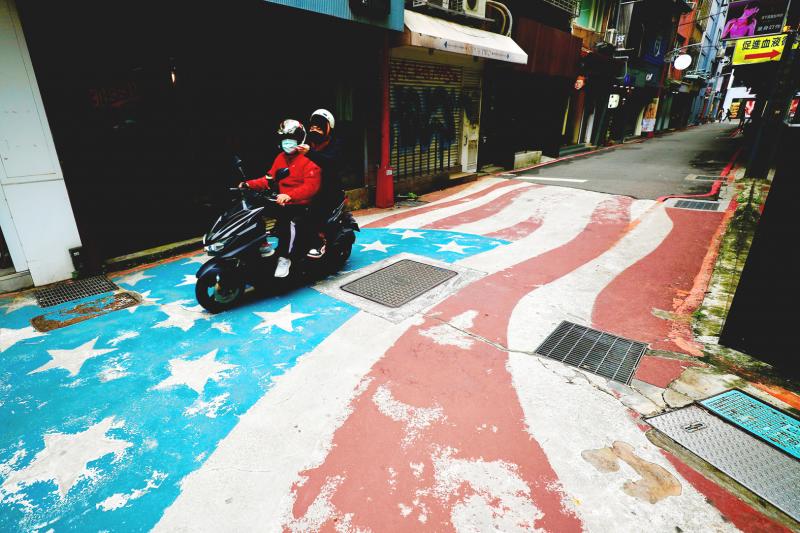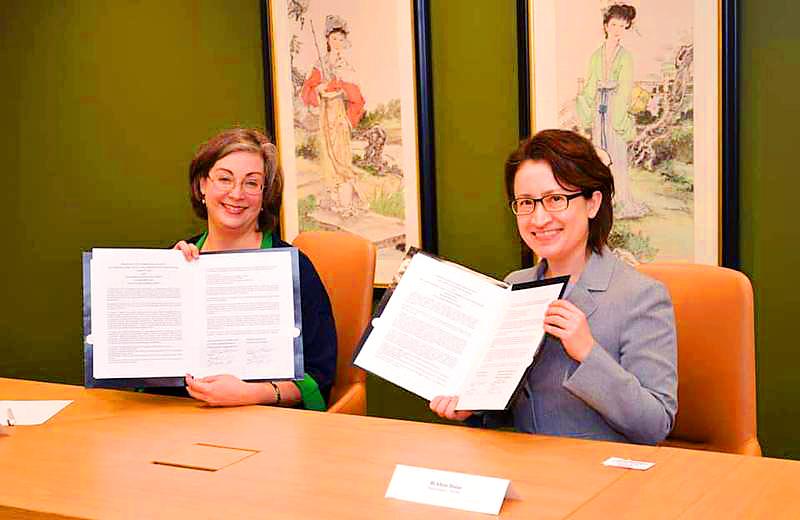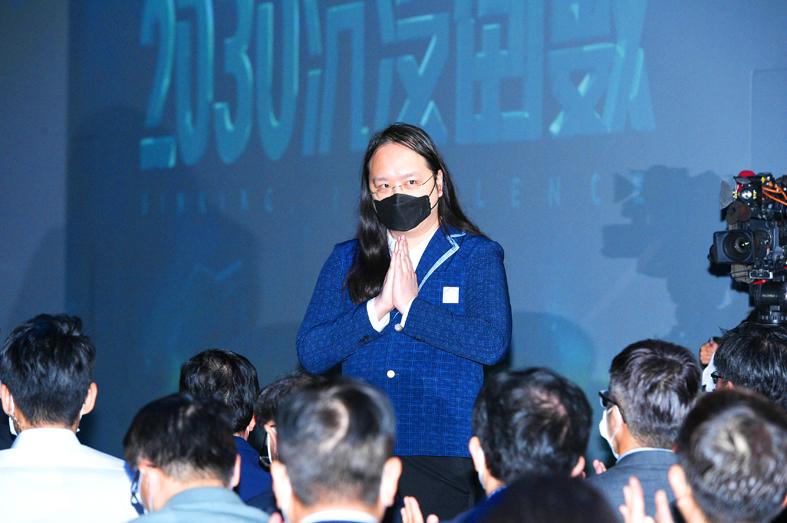Minister Without Portfolio Audrey Tang (唐鳳) and Representative to the US Hsiao Bi-khim (蕭美琴) are to attend the US-led Summit for Democracy on Dec. 9 and 10, the government said yesterday, after US President Joe Biden announced the list of guests for the virtual event.
The US Department of State on Tuesday announced a list of 110 invited participants, including Taiwan, Australia, Canada, the Czech Republic, France, Germany, Japan and the UK.
China and Russia were not invited, and Beijing expressed anger at the decision to invite Taiwan.

Photo: RITCHIE B. TONGO, EPA-EFE
The summit is to revolve around three key themes: Defending against authoritarianism, addressing and fighting corruption, and promoting respect for human rights, the department said in a statement in February, adding that the event would engage leaders from governments, civil society and the private sector.
Tang and Hsiao are to share how Taipei has improved government operations with technological and digital tools, and convey Taiwan’s commitment to defending democracy, Presidential Office spokesman Xavier Chang (張惇涵) said in a statement.
The firm partnership between Taipei and Washington is evidenced in their close interactions in areas ranging from the summit, the second US-Taiwan Economic Prosperity Partnership Dialogue on Tuesday and the third annual US-Taiwan Consultations on Democratic Governance in the Indo-Pacific Region on Monday last week, Chang said.

Photo: Lu Yi-hsuan, Taipei Times
At a US House of Representatives Committee on Foreign Affairs hearing in March, US Secretary of State Antony Blinken had promised that the US would invite Taiwan to the summit, the Ministry of Foreign Affairs said.
The US is still planning the summit’s agenda, while maintaining close communication with Taiwan in a bid to better reflect the nation’s democratic achievements, the ministry said.
To echo Washington’s goals for the summit, the government has taken concrete action, such as completing its first national human rights action plan last year, it said.

Photo: Chen Yi-kuan, Taipei Times
The government would also continue to promote democracy and human rights through the Global Cooperation and Training Framework, it said.
Taiwan is on the front line of defending freedom and democracy against authoritarianism, and would continue to work with civic groups at home and abroad, as well as like-minded countries, to be a force for good in the world, the ministry said.
Experts on China said that Washington inviting Taipei to attend the summit was significant.
“I agree Taiwan more than qualifies- but it does seem to be only democratic govt invited that the US govt does not officially recognize. So its inclusion is a big deal,” Hofstra University law professor Julian Ku (古舉倫) wrote on Twitter.
“For this kick-off summit ... there’s a case for getting a broad set of actors into the room: It provides for a better exchange of ideas than setting a perfect bar for qualification,” Open Society Foundations codirector Laleh Ispahani told reporters.
Rather than using the summit as an anti-China meeting, Ispahani urged Biden to address “the serious decline of democracy around the world — including relatively robust models like the US.”
There was an angry rebuke from Beijing, which said it “firmly opposes” the invitation of Taiwan to “the so-called Summit for Democracy.”
Additional reporting by AFP

CHAOS: Iranians took to the streets playing celebratory music after reports of Khamenei’s death on Saturday, while mourners also gathered in Tehran yesterday Iranian Supreme Leader Ayatollah Ali Khamenei was killed in a major attack on Iran launched by Israel and the US, throwing the future of the Islamic republic into doubt and raising the risk of regional instability. Iranian state television and the state-run IRNA news agency announced the 86-year-old’s death early yesterday. US President Donald Trump said it gave Iranians their “greatest chance” to “take back” their country. The announcements came after a joint US and Israeli aerial bombardment that targeted Iranian military and governmental sites. Trump said the “heavy and pinpoint bombing” would continue through the week or as long

TRUST: The KMT said it respected the US’ timing and considerations, and hoped it would continue to honor its commitments to helping Taiwan bolster its defenses and deterrence US President Donald Trump is delaying a multibillion-dollar arms sale to Taiwan to ensure his visit to Beijing is successful, a New York Times report said. The weapons sales package has stalled in the US Department of State, the report said, citing US officials it did not identify. The White House has told agencies not to push forward ahead of Trump’s meeting with Chinese President Xi Jinping (習近平), it said. The two last month held a phone call to discuss trade and geopolitical flashpoints ahead of the summit. Xi raised the Taiwan issue and urged the US to handle arms sales to

State-run CPC Corp, Taiwan (CPC, 台灣中油) yesterday said that it had confirmed on Saturday night with its liquefied natural gas (LNG) and crude oil suppliers that shipments are proceeding as scheduled and that domestic supplies remain unaffected. The CPC yesterday announced the gasoline and diesel prices will rise by NT$0.2 and NT$0.4 per liter, respectively, starting Monday, citing Middle East tensions and blizzards in the eastern United States. CPC also iterated it has been reducing the proportion of crude oil imports from the Middle East and diversifying its supply sources in the past few years in response to geopolitical risks, expanding

Pro-democracy media tycoon Jimmy Lai’s (黎智英) fraud conviction and prison sentence were yesterday overturned by a Hong Kong court, in a surprise legal decision that comes soon after Lai was jailed for 20 years on a separate national security charge. Judges Jeremy Poon (潘兆初), Anthea Pang (彭寶琴) and Derek Pang (彭偉昌) said in the judgement that they allowed the appeal from Lai, and another defendant in the case, to proceed, as a lower court judge had “erred.” “The Court of Appeal gave them leave to appeal against their conviction, allowed their appeals, quashed the convictions and set aside the sentences,” the judges